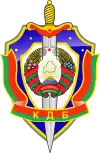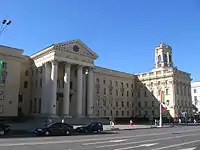State Security Committee of the Republic of Belarus
The State Security Committee of the Republic of Belarus (Russian: Комитет государственной безопасности Республики Беларусь, КГБ, KGB; Belarusian: Камітэт дзяржаўнай бяспекі, КДБ; translit. Kamitet Dziaržaǔnaj Biaspieki, KDB) is the national intelligence agency of Belarus. Along with its counterparts in Transnistria and South Ossetia,[1] it is one of the few intelligence agencies that kept the Russian name "KGB" after the dissolution of the Soviet Union, albeit it is lost in translation when written in Belarusian (becoming KDB rather than KGB).
| Комитет государственной безопасности (КГБ) Республики Беларусь | |
 Emblem of the KGB of Belarus | |
 KGB headquarters in Minsk | |
| Special service overview | |
|---|---|
| Formed | 23 October 1991 |
| Preceding agencies | |
| Jurisdiction | Belarus |
| Headquarters | Minsk, Belarus |
| Employees | Classified |
| Annual budget | Classified |
| Special service executive |
|
| Website | kgb |
It is the Belarusian successor organization to the KGB of the Soviet Union. Felix Edmundovich Dzerzhinsky, who founded the Cheka – the original Bolshevik intelligence police – was born in what is now Belarus and remains an important figure in the state ideology of Belarus under president Alexander Lukashenko as well as a patron of the KGB of Belarus. It is governed by the law About State Security Bodies of the Republic of Belarus.[2]
Major General Vadim Zaitsev, who was in charge of Lukashenko's personal security, was appointed its leader in July 2008. His tenure lasted until November 2012 and he was replaced by Valery Vakulchik.[3] The KGB is formally controlled by the President of Belarus, Alexander Lukashenko. Human rights organizations, the United States, and the European Union have accused the KGB of secret police activities and human rights abuses.
The KGB has command over the Alpha Group as the main counter-terrorist unit, although they can be tasked to help the militsiya and other law enforcement organizations in anti-crime operations.
History
On 1 March 1922, under the auspices Central Executive Committee of the BSSR, a State Political Directorate is formed. In July 1934, an NKVD republican affiliate was formed in the BSSR. 10 years later, during a reform of the Soviet Ministry of Internal Affairs, the Committee for State Security of the Belarusian Soviet Socialist Republic (KGB of the BSSR) was formed, which would become an independent agency in 1978. On 25 August 1991, the Supreme Soviet of Belarus passed the Declaration of State Sovereignty of the Belarusian Soviet Socialist Republic into constitutional law, effectively declaring independence from the USSR. In September 1991, the KGB of the BSSR was renamed to the KGB of the Republic of Belarus, becoming the new national security body of the state. In October of that year, the Supreme Soviet mandated by law that the State Security Committee is subordinate to the Supreme Council of Belarus. In order to ensure the security of the new republic, the government provided regulations to the agency in January 1992.[4]
KGB headquarters
The headquarters of the State Security Committee (Russian: Здание КГБ, Belarusian: Будынак КДБ) is located on Independence Avenue at the corner from Komsomolskaya Street. The building was built between 1945 and 1947 by architects Mikhail Parusnikov and Gennady Badanov.[5] The building was erected in the style of Stalinist Architecture and Neoclassicism. The left wing stretches across Independence Avenue to adjoin the neighboring House of the Minsk Mutual Agricultural Insurance Association.
Structure
- Main Directorate of Counterintelligence Activities
- Main Directorate of Economic Security and Anti-Corruption
- Main Directorate for Provision of Operational Search Activities
- Government Communications Department
- Office of Military Counterintelligence (UVKR)
- Investigative Committee[6]
Chairmen
- Eduard Shirkovsky (30 October 1990 – 25 January 1994)
- Gennady Lavitsky (22 February – 21 July 1994)
- Vladimir Yegorov (28 July 1994 – 20 December 1995)
- Vladimir Matskevich (20 December 1995 – 27 November 2000)
- Leonid Erin (27 November 2000 – 18 November 2004)
- Stepan Sukhorenko (20 January 2005 – 17 July 2007)
- Yuri Zhadobin (17 July 2007 – 15 July 2008)
- Vadim Zaitsev (15 July 2008 – 9 November 2012)
- Leonid Maltsev (9 – 16 November 2012)
- Valery Vakulchik (16 November 2012 – 3 September 2020)
- Ivan Tertel (since 3 September 2020)
Role in political repressions
According to human rights organisations in the United States, and the European Union, the KGB and its senior leadership play a key role in human rights violations and political repressions in Belarus. The KGB has maintained both the name, the symbols and some of the repressive functions of its Soviet predecessor, the KGB of the Soviet Union.
Several dozens former Chairmen and senior officers of the KGB of Belarus have been included in the sanctions lists of the European Union and the United States, especially following the brutal crackdown of peaceful protests that followed the allegedly falsified presidential elections of 2006 and 2010.[7] Against most of them, the sanctions have been lifted in 2016 following an improvement of Belarus–European Union relations.
Chairmen and Deputy Chairmen
- Stepan Sukhorenko, Chairman of the KGB in 2005–2007, including during the 2006 Belarusian presidential election. On EU sanctions list in 2006–2016; remains under sanctions by the United States.[8]
- Vadim Zaitsev, Chairman of the KGB. According to the decision of the European Union, he is “responsible for transforming the KGB into the main organ of repression of civil society and of the democratic opposition” and for state propaganda accusing the protesters of bringing weapons to their rally.” According to the EU, Zaitsev “personally threatened the lives and health of the wife and child of former presidential candidate, Andrei Sannikov. He is the main initiator of orders for unlawful harassment of democratic opposition, the torture of political opponents and the mistreatment of prisoners.”[9]
- Vasily Dementei, First Deputy Chairman of the KGB; included in the EU sanctions list after crackdown of protests that followed the controversial presidential election of 2006.
- Igor Andreevich Bakhmatov, former Deputy Chairman of the KGB in charge of the staff and the organisation of their tasks, responsible for the repressive work of the KGB against civil society and democratic opposition.[9]
- Vasili Ivanovich Dementey, former First deputy Chairman of the KGB (2005–2007); responsible for repressions against civil society and the democratic opposition, in particular after the presidential election of 2006 and in 2007.
- Viktor Pavlovich Vegera, First Deputy Chairman of the KGB.
- Leonid Nikolaevich Dedkov, Deputy Chairman of the KGB.
- Nikolai Zinovievich Smolenski, former Deputy Chairman of the KGB.
- Nikolai Konstantinovich Svorob, former Deputy Chairman of the KGB.
- Petr Vladimirovich Tretiak, former Deputy Chairman of the KGB and Member of the Commission of the Security Council on radio frequencies.
- Ivan Stanislavovich Tertel, Deputy Chairman of the KGB, in charge of economic crime and the fight against corruption.
Torture
- Colonel Orlov, Alexandr Vladimirovich, head of the KGB detention centre in Minsk: according to the EU, he was personally responsible for "cruel, inhuman and degrading treatment or punishment of detainees" in the weeks and months after the crackdown on the protests in Minsk on 19 December 2010, on the eve of the 2010 presidential election. He has been on EU sanctions list between 2011 and 2016.[9]
- Colonel Chernyshev, Oleg Anatolievich; he allegedly personally participated in tortures of opposition activists in the KGB detention centre in Minsk after the crackdown on the post-election protest demonstration in Minsk on 19 December 2010.[9]
- Lieutenant-Colonel Sukhov, Dmitri Vyacheslavovich, operative of the military counter-intelligence of the KGB; accused of falsifying evidence and using threats in order to extort confessions from detained opposition activists in the KGB detention centre in Minsk after the crackdown on the post-election protest demonstration in Minsk on 19 December 2010.[9]
- Lieutenant Colonel Traulko, Pavel, former operative of the military counter-intelligence of the KGB, then head of the press service of the newly formed Investigative Committee of Belarus. He is accused of falsifying evidence and using threats in order to extort confessions from opposition activists in the KGB detention centre in Minsk after 19 December 2010. According to the EU, he was directly responsible for the use of “cruel, inhuman and degrading treatment or punishment and for denying the right to a fair trial”.[9]
Sector (Board) commanders
- Yaruta, Viktor Gueorguevich, Head of the KGB Board on State Communications
- Maslakov, Valeri Anatolievich, Head of the KGB Board of Intelligence
- Shugaev, Sergei Mikhailovich, Head of the KGB Counter-Intelligence Division and former Deputy Head of the KGB Counter-Intelligence Board
- Sanko, Ivan Ivanovich, Major, senior investigator of the KGB
- Tolstashov, Aleksandr Olegovich, Head of the KGB Board on Protection of the Constitutional Order and Fight Against Terrorism
- Voropaev, Igor Grigorievich, former Head of the KGB Board on State Communications
- Volkov, Sergei Mikhailovich, former Head of the KGB Board of Intelligence
- Zakharov, Alexey Ivanovich, former Head of Military Counter-intelligence Board of the KGB
Regional commanders
In 2011, commanders of the KGB in the regions of Belarus were accused by the EU of being responsible for political repressions in their regions:[9]
- Busko, Igor Yevgenyevich, Head of the KGB of the Brest Region;
- Gerasimenko, Gennadi Anatolievich, former Head of the KGB of the Vitebsk Region
- Kalach, Vladimir Viktorovich, Head of the KGB of the Minsk Region and the city of Minsk, former Deputy Head of the KGB for Minsk
- Korzh, Ivan Alekseevich, Head of the KGB of the Hrodna Region
- Kuznetsov, Igor Nikonovich, former Head of the KGB in the Minsk Region and in Minsk city
- Leskovski, Ivan Anatolievich, Head of the KGB for Homel and former Deputy Head of the KGB for Homel
- Sergeenko, Igor Petrovich, Head of the KGB of the City District of Mahiliou
See also
References
- "South Ossetian KGB Says Situation Could Get Out Of Control". Radio Free Europe. 1 December 2011. Retrieved 22 February 2014.
- "The State Security Committee of the Republic of Belarus". www.kgb.by. Retrieved 3 March 2018.
- "Belarusian KGB's new chief is Valery Vakulchik". DiploNews. 20 November 2012. Archived from the original on 19 December 2012. Retrieved 31 March 2013.
- "История органов госбезопасности". Retrieved 2019-05-31.
- С. В. Марцелеў (гал. рэд) (1988), Збор помнікаў гісторыі і культуры Беларусі. Мінск, ISBN 5-85700-006-8
- "Lukashenko meets with chairman of Belarus' Investigative Committee". Belta. 2020-06-11. Archived from the original on 2020-08-22. Retrieved 2020-08-22.
- Поўны спіс 208 беларускіх чыноўнікаў, якім забаронены ўезд у ЕС - Nasha Niva, 11.10.2011
- "Sanctions List Search". sanctionssearch.ofac.treas.gov. Retrieved 3 March 2018.
- "EUR-Lex - 32012D0642 - EN - EUR-Lex". eur-lex.europa.eu. Retrieved 3 March 2018.
External links
| Wikimedia Commons has media related to State Security Committee of the Republic of Belarus. |